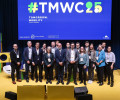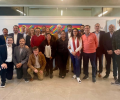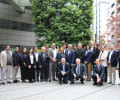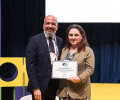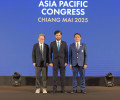Solutions for Multimodal Ecosystems: the FIA discusses safe and sustainable mobility at 2019 Movin’On Summit
The FIA’s presence at the third edition of Movin’On Summit was an opportunity for the Federation to underline its commitment to the safe, sustainable and accessible mobility of tomorrow.

At the invitation of Michelin – a founding partner of the FIA Smart Cities initiative – the FIA was strongly involved in this year’s Movin’On Summit. Created and inspired by Michelin, the Movin’On Summit gathers leaders from the academic, political, urban planning and business worlds to share best practices and identify concrete solutions and technologies to address the major challenges of mobility.
The FIA’s presence was assured on the main Forum stage with an interview between FIA President Jean Todt by Mark Richardson, motoring journalist of the Globe and Mail. Invited to give his views on “Redefining Tomorrow’s Multimodal Mobility Safety”, Jean Todt spoke about how technological innovations, increased connectivity, and social change are shaping new forms of mobility. Yet, central to these developments was the issue of safety, and he insisted that, despite the potential benefits new mobility options offered, safety must always come first, “Safe system approaches and ‘Vision Zero’ strategies need to be adopted by governments around the world. By making our roads and vehicles safer, ensuring and enforcing safer speeds, and providing effective post-crash care, we can put a stop to the loss of life on our roads. Smart cities are also safe cities. Ensuring that road users get to their destination is the smartest thing we can do.”
Following this, the Fédération organised an interactive panel discussionon the role of new mobility services to foster safe, sustainable and accessible cities.
Moderated by Andrew McKellar, Secretary General for Automobile Mobility and Tourism, the discussion gathered Thierry Willemarck, FIA Deputy President for Automobile Mobility and Tourism and Touring Club Belgium (TCB) CEO, Tim Shearman, Canadian Automobile Association (CAA) President and President of FIA Region II, Bryant Walker Smith, Assistant Professor, Assistant Professor in the School of Law at the University of South Carolina,and David Zipper, Resident Fellow at the German Marshall Fund.
Panellists exchanged ideas on topics such as opportunities and challenges in the development of smart cities, data sharing and its legal ramifications, and the difficulties in establishing Mobility as a Service (MaaS) systems.
Addressing MaaS systems, Thierry Willemarck who, as the CEO of TCB, spoke of his Club’s efforts in creating a mobility aggregator as a way to address some of the recurrent obstacles in MaaS systems, “There is a lack of coordination between public and private sectors, and this is holding back MaaS,” he said. Better coordination amongst all stakeholders would be needed in the future, but building consumer confidence had to be done now. Putting the consumer at the centre of this transition towards a more flexible and multimodal mobility offer would be crucial, “User behaviour will be key to creating a change in mobility patterns.”
Tim Shearman highlighted the role of FIA Member Clubs in driving that transformation. “We see ourselves as an honesty broker. We gather information, go to government with real data, and advocate for changes to mobility based on the needs of users."
Commenting on recent legal challenges to data sharing in the state of California, David Zipper insisted on data as being one of the most important conditions for cities to succeed in changing their transport offer and improving user experience, “Cities really need to have the power to exercise the data that is collected by mobility operators. A strong regulatory framework is necessary to ensure private operators share their data. We have to empower cities to deliver the next appropriate mobility solution.”
For Bryant Walker Smith, a strong regulatory system would also be necessary to ensure that companies launching these technologies are doing so in the best interests of users. Speaking about technological developments such as artificial intelligence (AI) and autonomous vehicles (AVs), he mentioned that the “key regulatory question that we will face in deploying these technologies is ‘how do we know that the companies behind these innovations are worthy of the trust that us, as consumers, will place in them and their products?’ A strong regulatory framework addressing the trustworthiness of these companies will guarantee transparency and accountability, both of which are essential if we are to ensure that the mobility systems of tomorrow are safe”.
Building efficient mobility services for the future means greater deployment of low carbon mobility alternatives that can help tackle pollution and air quality issues, especially in urban areas.
To further emphasise on the commitment of the FIA to promote such solutions, Thierry Willemarck, FIA Deputy President for Automobile Mobility and Tourism, took part in the World Economic Forum’s workshop on “The fleet as flywheel: Establishing the most effective practices for accelerating the decarbonisation of urban mobility”.
The workshop was the occasion to discuss the critical need to hasten the deployment of zero emission vehicles (ZEV) in all domains of mobility – movement of people and goods – to reach long term carbon reduction goals. It was discussed that one way to achieve this was to incentivise high-use vehicles – such as fleets, taxis, and mobility-as-a-service vehicles – to transition to Zero Emissions Vehicles (ZEV). To do so, participants looked at ways adapted infrastructure, affordable vehicles, and consumer-focused policies could encourage their adoption.
The Movin’On Summit was also an opportunity to hear from FIA Members, the Canadian Automobile Association and the CAA’s Quebecois Club. During an interactive lunch session, the CAA and CAA Quebec organised a discussion on “Finding a balance between conventional and new mobility” where the Club spoke about its ongoing research project into social acceptability and road sharing behaviour towards AVs. To test this, the Club has been running Canada’s first fully electric AV shuttle in the city of Candiac. The project has been closely coordinated with Transport Quebec, and the National Institute of Scientific Research will evaluate the findings, to be presented in 2020 at the end of the trial.
Photo: ©Arianne Bergeron

 Facebook
Facebook Twitter
Twitter